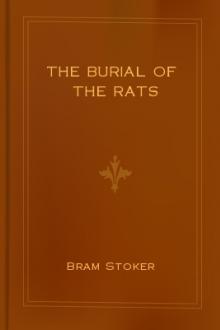The Lady of the Shroud, Bram Stoker [most life changing books .txt] 📗

- Author: Bram Stoker
- Performer: -
Book online «The Lady of the Shroud, Bram Stoker [most life changing books .txt] 📗». Author Bram Stoker
skimming upwards towards the Flagstaff. Despite the wind, it arrived
there in an incredibly short time. Immediately after his flight
another aero, a big one this time, glided to the platform. To this
immediately stepped a body of ten tall, fine-looking young men. The
driver pulled his levers, and the plane glided out on the track of
the King. The Western King, who was noticing, said to the Lord High
Admiral, who had been himself in command of the ship of war, and now
stood close behind him:
“Who are those men, Admiral?”
“The Guard of the Crown Prince, Your Majesty. They are appointed by
the Nation.”
“Tell me, Admiral, have they any special duties?”
“Yes, Your Majesty,” came the answer: “to die, if need be, for the
young Prince!”
“Quite right! That is fine service. But how if any of them should
die?”
“Your Majesty, if one of them should die, there are ten thousand
eager to take his place.”
“Fine, fine! It is good to have even one man eager to give his life
for duty. But ten thousand! That is what makes a nation!”
When King Rupert reached the platform by the Flagstaff, the Royal
Standard of the Blue Mountains was hauled up under it. Rupert stood
up and raised his hand. In a second a cannon beside him was fired;
then, quick as thought, others were fired in sequence, as though by
one prolonged lightning-flash. The roar was incessant, but getting
less in detonating sound as the distance and the hills subdued it.
But in the general silence which prevailed round us we could hear the
sound as though passing in a distant circle, till finally the line
which had gone northward came back by the south, stopping at the last
gun to south’ard of the Flagstaff.
“What was that wonderful circle?” asked the King of the Lord High
Admiral.
“That, Your Majesty, is the line of the frontier of the Blue
Mountains. Rupert has ten thousand cannon in line.”
“And who fires them? I thought all the army must be here.”
“The women, Your Majesty. They are on frontier duty to-day, so that
the men can come here.”
Just at that moment one of the Crown Prince’s Guards brought to the
side of the King’s aero something like a rubber ball on the end of a
string. The Queen held it out to the baby in her arms, who grabbed
at it. The guard drew back. Pressing that ball must have given some
signal, for on the instant a cannon, elevated to perpendicular, was
fired. A shell went straight up an enormous distance. The shell
burst, and sent out both a light so bright that it could be seen in
the daylight, and a red smoke, which might have been seen from the
heights of the Calabrian Mountains over in Italy.
As the shell burst, the King’s aero seemed once more to spring from
the platform out into mid-air, dipped as before, and glided out over
the Blue Mouth with a rapidity which, to look at, took one’s breath
away.
As it came, followed by the aero of the Crown Prince’s Guard and a
group of other aeros, the whole mountain-sides seemed to become
alive. From everywhere, right away up to the farthest visible
mountain-tops, darted aeroplanes, till a host of them were rushing
with dreadful speed in the wake of the King. The King turned to
Queen Teuta, and evidently said something, for she beckoned to the
Captain of the Crown Prince’s Guard, who was steering the plane. He
swerved away to the right, and instead of following above the open
track between the lines of warships, went high over the outer line.
One of those on board began to drop something, which, fluttering
down, landed on every occasion on the bridge of the ship high over
which they then were.
The Western King said again to the Gospodar Rooke (the Lord High
Admiral):
“It must need some skill to drop a letter with such accuracy.”
With imperturbable face the Admiral replied:
“It is easier to drop bombs, Your Majesty.”
The flight of aeroplanes was a memorable sight. It helped to make
history. Henceforth no nation with an eye for either defence or
attack can hope for success without the mastery of the air.
In the meantime—and after that time, too—God help the nation that
attacks “Balka” or any part of it, so long as Rupert and Teuta live
in the hearts of that people, and bind them into an irresistible
unity.
Footnotes:
{1} Vladika, a high functionary in the Land of the Blue Mountains.
He is a sort of official descendant of the old Prince-Bishops who
used at one time to govern the State. In process of time the system
has changed, but the function—shorn of its personal dominance—
remains. The nation is at present governed by the Council. The
Church (which is, of course, the Eastern Church) is represented by
the Archbishop, who controls the whole spiritual functions and
organization. The connecting-link between them—they being quite
independent organizations—is the Vladika, who is ex officio a member
of the National Council. By custom he does not vote, but is looked
on as an independent adviser who is in the confidence of both sides
of national control.
{2} EDITORIAL NOTE—We shall, in our issue of Saturday week, give a
full record of the romantic story of Queen Teuta and her Shroud,
written by Mr. Mordred Booth, and illustrated by our special artist,
Mr. Neillison Browne, who is Mr. Booth’s artistic collaborateur in
the account of King Rupert’s Coronation.
{3} Greatest Kingdom—Editor Free America.





Comments (0)